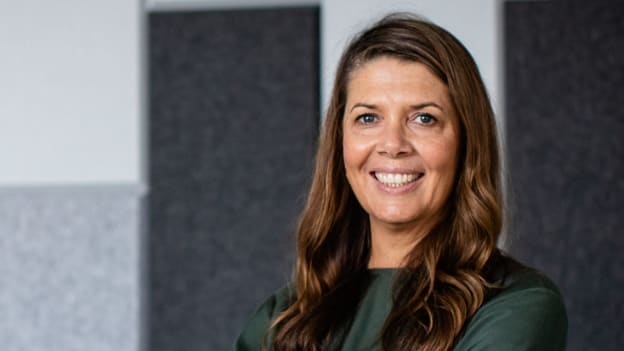Let technology power your business and cultural aspirations: Ingrid Jenkins at Microsoft Australia

The 'new' ways of working that resulted from the pandemic aren't so new any more. Today, most organisations have come to terms with digitalisation and the remote or hybrid model, and it's time to take the next step: to go from the idea of 'digital and hybrid work for business continuity', to the concept of 'digital and hybrid work for business and cultural success'.
People Matters asked Ingrid Jenkins, Head of HR at Microsoft Australia, for her take on building culture in today's world of work. Microsoft and its tech industry counterparts have been exploring new work paradigms and their relation to organisational culture since long before digital and hybrid went mainstream, and Ingrid herself has been in the industry for the last two decades. Here's what she shared.
As remote and hybrid work and hiring becomes a norm, with technology the basis for most interactions, what shifts do you see in the approach to culture-building?
At Microsoft we are committed to exploring new ways of working that shift paradigms but don’t detract from our focus on culture.
We have drawn key insights from the Microsoft 2021 Work Trend Index report that found over 70 percent of workers want flexible remote work options to continue and over 65 percent crave more in-person time with their teams.
While some call this the “hybrid paradox”, a true hybrid construct does not need to be one or the other.
Our workforce at Microsoft will do both as it offers employees the flexibility to work anywhere on any given day while supporting them to use a dedicated Microsoft work site to further connect, collaborate, and innovate in-person. We use our own Microsoft technologies like Teams to enable inclusive hybrid meetings, and back this up with team agreements that are grounded in principles of participation and inclusion for all – regardless of whether they are inside or outside the room.
We believe that building a successful hybrid culture must start from the top down, and that by equipping our managers to lead in these new work environments, we are setting our workforce and business up for success. One example of this is our well-established manager expectation of ‘Model, Coach, Care’.
How much of a role do you see digital innovations playing in today's understanding of work dynamics and organisational culture?
As digital tools have become critical to enabling a great employee experience, business leaders across every industry are embracing this opportunity to re-evaluate their approach to building organisational culture. At Microsoft, we believe this has resulted in a growing need and demand for a new category of technology solutions called ‘employee experience platforms’.
Technologies like Microsoft Teams and our employee experience platform Viva are bringing together communications, knowledge, learning, resources, and insights in one place. This makes it easier for employees and managers to feel empowered and engaged in their work online. For instance, organisations are now able to capture employee sentiment at any given time and this regular feedback loop allows leaders to be more agile in responding to changes needed to support a sense of wellbeing at an individual level, positive work dynamics at a team level, and improve culture at an organisational level.
How is all this playing out for Microsoft's growth mindset? Could you share how you're leveraging today's technological tools to shape an organisational culture that encompasses the changes in the workforce?
Shaping organisational culture, particularly as we undergo a mass change to how we work, is always going to be an iterative process. There will be growing pains, and that’s okay because we will take on those learnings to continue refining our thinking and approach. It will require undoing of previous habits and establishing new ones. This can be anything from optimising Outlook so that default meeting times are set to 20 minutes or 50 minutes, not 30 or 60, to give your brain a break between meetings, to making the most of technology to engage flexibly like walking meetings.
As leaders, we need to challenge ourselves by asking “why not?” when assessing new approaches. Why not try something new? Why not experiment an approach that might transform your workplace culture? Why not explore new talent pools that may exist beyond our geographic proximity?
Tools like Microsoft Teams and Viva offer our teams the data and insights to experiment with practices that work best for them.
What's the path forward for the virtual working environment? What cultural traits do you see organisations adopting or enhancing, vs. the ones that will be diminished?
Organisations must assess both capability and mindset, and there are a few behaviours organisations should consider:
Demonstrate deep care and authenticity – As we have seen in last 15 months, care matters and can deeply impact a sense of engagement and belonging among employees. Care and authenticity have proved the greatest asset for most organisations, and now is the opportunity to reflect on how leaders can continue to show up in a hybrid work environment.
Coach for trust and empowerment – This is paramount in a hybrid workplace. Leaders must continue to set clear expectations on outcomes and coach their team members to deliver, but do so with a high level of trust and empowerment.
Revisit performance culture – Consider how you measure performance. Impact and outcomes should be measurable irrespective of where a person conducts their work.
Foster an experimental mindset – We are all learning together and it’s okay to not get everything right at the outset. Now is the time to experiment, challenge established thinking, explore new habits, and be agile as we learn through these experiences. How do we use this opportunity to think differently?
Finally, culture-building can't just fall on the shoulders of people leaders. How are you collaborating with digital and tech leaders to shape workplace interactions and attitudes today?
Culture change requires intentionality across all levels of the organisation, which includes conducting a comprehensive review of systems, policies, and processes to ensure everything is tightly aligned with the organisation’s cultural attributes.
Technology plays a powerful role in enabling this change, but it cannot be the sole solution. Where technology leaders can make a difference is by advocating for opportunities on how technology can enable and help accelerate organisational culture. For example, at Microsoft, we are leveraging our own collaboration tools to build inclusive team connections and listen to employee feedback, and using data to help us all prioritise our time and our wellbeing.
There is huge opportunity for every organisation to test whether their technologies are being fully utilised to power their business and cultural aspirations.














